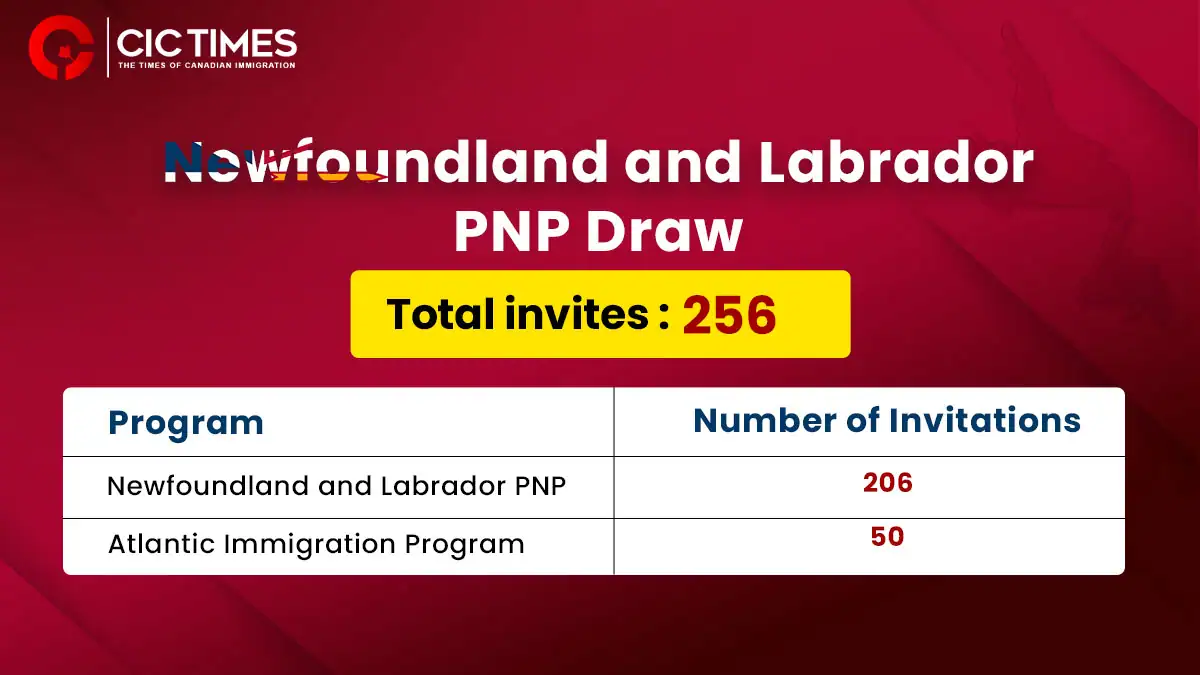Newfoundland and Labrador Secures More PNP Nominations for 2025

The provincial government of Newfoundland and Labrador has successfully negotiated an increase of 1,000 nominations for its 2025 PNP. This brings its total allocation for the year to 2,050.
This brings its total allocation for the year to 2,050. Additionally, the province's quota under the Atlantic Immigration Program (AIP) remains at 475, making the overall nomination capacity 2,525.
Temporary Suspension of New Applications
The Newfoundland and Labrador Provincial Nominee Program (NLPNP) has decided to temporarily halt new application submissions for nominations and job vacancy assessments until mid-February. Additionally, the province’s 25-day service standard for processing applications will be put on hold.
However, applications for healthcare professionals and other high-demand occupations will still be reviewed on a case-by-case basis. This pause aims to allow time for refining immigration procedures that enhance efficiency in matching skilled immigrants with job opportunities in Newfoundland and Labrador.
How Did Newfoundland and Labrador Secure More Allocations?
The increase in allocations came as part of an agreement with the Canadian federal government, in which Newfoundland and Labrador committed to accepting a greater number of humanitarian migrants. The province will welcome 290 humanitarian immigrants over the next two years.
Humanitarian migrants include individuals who relocate to Canada due to persecution, conflict, or hardship in their home countries. This category encompasses those affected by crises in regions such as Ukraine, Sudan, and Hong Kong.
Will Other Provinces Receive Additional Allocations?
It remains uncertain whether other provinces will receive similar increases in their allocations. However, Immigration Minister Marc Miller has suggested that provinces and territories willing to accept more asylum seekers may have an opportunity to regain PNP nomination spots.
He emphasized on social media that governments willing to collaborate responsibly stand a better chance of seeing their PNP quotas reinstated. Newfoundland and Labrador’s success in negotiating an improved allocation suggests that other provinces may also be able to reverse cuts.
Initially, the province’s PNP allocations were set to drop from 2,100 in 2024 to 1,050 in 2025, reflecting the 50% reduction imposed by IRCC. However, after negotiations, the province managed to secure an allocation of 2,050, resulting in only a minor 2.3% decrease.

Other Provinces Facing PNP Reductions
Newfoundland and Labrador is not the only province affected by IRCC’s decision to cut PNP allocations for 2025. Several provinces, including Yukon and New Brunswick, have seen their allocations slashed as part of the 2025-2027 Immigration Levels Plan.
Yukon’s PNP allocation dropped from 430 in 2024 to 215 in 2025, leading to a delay in the reopening of its nomination intake. New Brunswick’s PNP allocation was reduced from 5,500 in 2024 to 2,750 in 2025, prompting a similar response from the provincial government.
Meanwhile, immigration ministers from Ontario, Manitoba, Alberta, and Saskatchewan have expressed concerns that these reductions will negatively impact their local economies and undermine their autonomy in immigration decision-making.
The table below shows the provincial allocation in 2024 and 2025:-
| Province / Territory | 2024 allocation | 2025 allocation |
| Alberta | 9,750 | 4,875 |
| British Columbia | 8,000 | 4,000 |
| Manitoba | 9,540 | 4,750 |
| New Brunswick | 5,500 | 2,750 |
| Northwest Territories | 300 | 150 |
| Saskatchewan | 8,000 | 3,625 |
| Yukon | 430 | 215 |
Canada’s Immigration Strategy for 2025
In October 2024, IRCC announced a 50% reduction in the PNP landings target as part of its 2025-2027 Immigration Levels Plan. The federal government justified this decision by citing affordability and housing challenges as key reasons for slowing immigration growth.
Immigration Minister Marc Miller and Prime Minister Justin Trudeau have urged provinces to work with IRCC to implement more sustainable immigration policies. The 2024 Immigration Levels Plan initially set a target of 110,000 PNP landings.
However, under the Canada Immigration Levels Plan 2025-2027, this target has been cut to 55,000. The case of Newfoundland and Labrador demonstrates that provinces willing to negotiate and accept humanitarian migrants may have a path to regaining lost PNP allocations.
Subscribe for FREE and stay updated
with the latest Canada Immigration News!
Source: gov.nl.ca
Related Posts

Newfoundland and Labrador PNP Issues 256 ITAS through New EOI System
By
Joseph Parker
[Published
14 Apr, 2025 | 04:06 AM]
3311

Newfoundland and Labrador Secures More PNP Nominations for 2025
By
Joseph Parker
[Published
08 Feb, 2025 | 04:10 AM]
3053

Latest NLPNP Draw results announced
By
Eva Olsen
[Published
22 Nov, 2021 | 05:49 AM]
2539

How to Immigrate to Newfoundland and Labrador?
By
Joseph Parker
[Published
16 May, 2023 | 05:20 AM]
2479
Stay up to date with the latest news












.webp)

Comments
We welcome your feedback
Your email address will not be published. Required fields are marked *